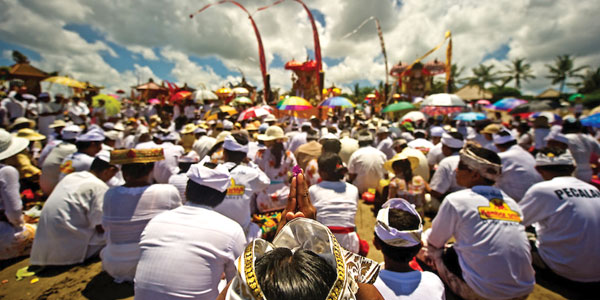
You’re in Bali, Indonesia, and everything just stops. Everything. The airport is closed. The streets are empty. You can’t go outside. Nor can you watch TV, or listen to the radio, or use your cellphone. The lights are off and you can’t use any electronic devices. Anyone who dares to break these rules and leave the house is taken back home or otherwise detained.
This isn’t a massive power failure or some sinister government-imposed curfew. This is “Nyepi,” the Bali Hindu New Year, a day entirely devoted to silence and self-reflection.
It’s hard to believe that an island of over 4 million people can so completely shut down. And yet it does, every year. Even tourists and residents who don’t observe the specific form of Hinduism practiced in Bali ― where religious ceremonies are part of the rhythm of daily life ― must comply with this ancient tradition.
That’s why I had come here, earlier this month. (This year Nyepi fell on March 7.) It was a few days before my birthday, and I wanted to have the opposite of a party. I’ve always found it a little absurd to receive presents and good wishes from people just because another year has passed since the day I was born.
This year I wanted to do something a little different; I put everything on hold, forgot about the news and flew to Indonesia. After two days in the air I landed in a kinder, greener and more chaotic Bali than I remembered.
The eve of Nyepi is a blast. Residents from every town on the island build huge, colorful “ogoh-ogoh,” statues made of cardboard and papier-mâché, ranging in height from 6 to 16 feet. The ogoh-ogoh symbolize evil spirits; many-limbed demons and monsters with hideous faces, bulging eyes, long tongues and swollen abdomens. At dusk, groups of 10 to 30 Balinese men carry these handmade nightmares along the main road as part of a ritual parade to the cemetery, where, hours later, the statues will be burned. This is how the Balinese exorcise evil.
But Bali’s spirits are particularly stubborn, and even having been reduced to ashes, many refuse to leave. So the next day everyone has to keep quiet in order to convince the gullible spirits that the island is empty and they must move on. This is the myth of Nyepi.
Once in Bali, I had to unlearn many things. During Nyepi, the hotel staff spoke only in mumbles, as if they didn’t want to wake the demons. We were told not to go to the beach or dive into the sea. Not that we would have gone outside anyway ― the streets were completely deserted. There was no music or sound of any kind. Darkness and silence prevailed throughout the island. We stayed inside and had a cozy candlelit dinner.
Many adults choose to fast during Nyepi. And the same kids who had yelled when the ogoh-ogoh passed the previous day had to learn to maintain their self-control and be introspective. I’m not aware of any other society in which children are taught the virtues of silence in quite the same way.
And though some foreigners could choose to cheat (they were given Wi-Fi access for their cellphones), the pull of the digital world gradually gave way to a different kind of mandate: Don’t do anything.
Something happens to your mind after 24 hours of silence. It’s easier to tell what is important and what is not. It’s not that you miraculously become a better person overnight; the powers of the gods have their limits. But you do start to react less viciously to everyday challenges. And it’s precisely that spirit of generosity and patience that so many of us admire in the Balinese people.
After Nyepi there are still 364 days of the year to be lived out loud. The next day, Bali’s streets filled immediately with thousands of motorcycles, the island’s primary means of transportation. You can often see a family of four ― dad driving, two kids tucked directly in front of and behind him, mom in back ― zooming by, without helmets on. However skillful they may be, Bali’s reckless bikers need all the protection of the gods in order to survive.
The roaring of planes taking off put an end to my sense of calm. But the silence of those 24 hours had been the best gift I could have asked for.
Nyepi: El Día de Silencio
BALI, Indonesia — Todo se detiene. Todo. No hay vuelos. El aeropuerto se cierra. No hay nadie en las calles. Nadie puede salir de su casa. Ni ver televisión o escuchar la radio. Las luces se apagan y no se deben usar aparatos electrónicos o celulares. Y quien se atreva a romper las reglas, es regresado a su casa o detenido. Así es el Nyepi — el año nuevo para los hindúes de Bali — un día al año que los balineses dedican al silencio y a la reflexión.
Es difícil de creer que una isla de más de 4 millones de habitantes se pare por completo. Pero así es. Incluso los turistas y los que no son seguidores del tipo muy particular de hinduismo que se practica en Bali — donde las ceremonias religiosas marcan el ritmo de la vida diaria — están obligados a seguir esta vieja tradición. Solo por un día.
Para eso vine. Estoy cumpliendo años y quería hacerlo de una forma totalmente opuesta a la fiesta. Siempre me ha parecido un poco absurdo y cursi que la gente te felicite y te regale cuando se suman los años a tu fecha de nacimiento. Hay cosas que nos merecemos. Pero el día que naces, simplemente, es cuestión de casualidad. Así que les puse pausa a los pendientes, dejé por un rato el mundo de las noticias y volé a Indonesia. Casi dos días y cuarto aviones después, aterricé en una Bali más verde, amable y caótica de lo que recordaba.
El día previo al Nyepi es el más divertido. En todos los pueblos de la isla sus habitantes construyen unas enormes y coloridas figuras de cartón y papel maché, de 2 a 5 metros de altura, que llaman “ogoh-ogoh.” Son en realidad monstruos o demonios — pesadillas hechas a mano, con cuerpos de animales y múltiples extremidades, con caras de horror, ojos salientes, lenguas largas y panzas infladas — que simbolizan los malos espíritus. Al atardecer, grupos de 10 a 30 balineses cargan sus ogoh-ogoh en una procesión por la calle principal del pueblo y los llevan al cementerio donde, horas después, son quemados. Así es como los balineses exorcizan la maldad.
El problema es que esos malos espíritus son muy tercos y, aún hechos humo, no se quieren ir. Por eso, al día siguiente, todos los habitantes de Bali se tienen que quedar callados para hacerle creer a los malos espíritus que la isla está vacía y se vayan a otro lado. Ese es el mito del Nyepi.
En la práctica tuve que desaprender muchas cosas. Durante el Nyepi los empleados del hotel donde me quedé hablaban con voces apenas audibles, como si no quisieran despertar a los demonios. Nos prohibieron salir a la playa o meternos al mar. Y fue imposible aventurarse a calles totalmente vacías. No hubo ruidos ni música. La cena fue con velas. La oscuridad y el silencio dominaron todo Bali.
Muchos adultos ayunan durante el Nyepi. Y los mismos niños que gritaban tras el paso de los ogoh-ogoh se ven forzados a aprender los rituales de la introspección, el autocontrol y la tolerancia. No conozco ningún otro lugar del mundo que colectivamente les enseñe a sus niños las virtudes del silencio.
La única trampa permitida, para algunos extranjeros, fue el uso del internet en sus celulares. Pero la inercia digital fue, poco a poco, cediendo ante una nueva orden: No hagas nada.
Tras 24 horas de silencio algo pasa en nuestras mentes. Es más fácil separar lo importante de lo superfluo. No es que milagrosamente te conviertas en una mejor persona; hasta los dioses balineses tienen sus límites. Pero sospecho que reaccionas con menos virulencia ante los retos típicos de la vida. Y es precisamente esa paciencia y generosidad en el trato lo que tantos admiramos de los habitantes de Bali. Es imposible no doblarse ante su sonrisa.
Luego del Nyepi aún quedan 364 días por vivir. Rápidamente las calles se fueron llenando con miles de motocicletas que, en la práctica, son el verdadero transporte colectivo de la isla. Es frecuente ver a familias de cuatro — niño frente al manubrio, papá manejando, niño/sandwich a sus espaldas y luego la mamá — rodando sin cascos. Y se necesitan a todos sus dioses para librar de accidentes a algunos de los más osados y hábiles motociclistas del planeta.
El rugir del avión despegando terminó con cualquier pretensión de tranquilidad. Pero el silencio de esas 24 horas ha sido, sin duda, mi mejor regalo.










